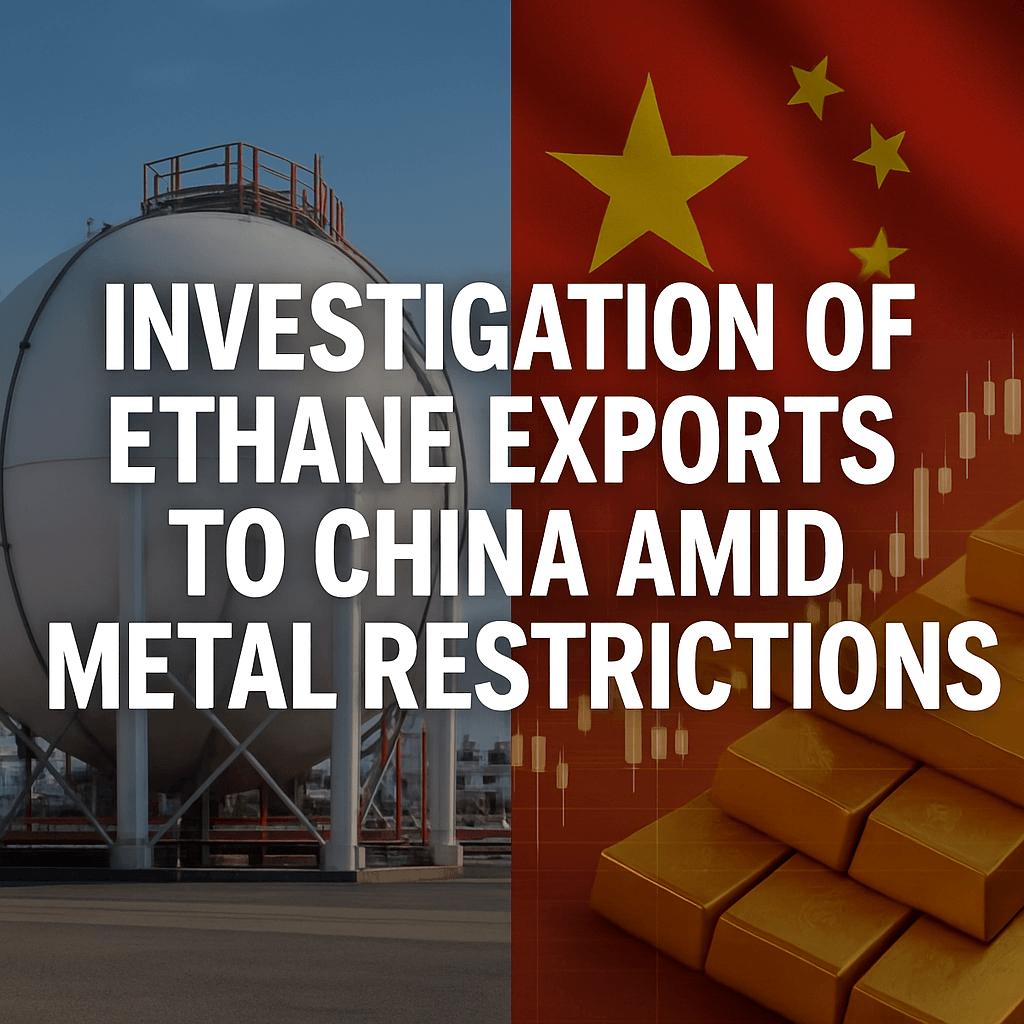Investigation of Ethane Exports to China Amid Metal Restrictions

The Trump administration is poised to reject U.S. ethane exports to China, a significant move impacting the global plastics manufacturing industry. This development occurs against the backdrop of escalating tensions between the United States and China regarding trade policies and resource accessibility.
Background of the Trade Tensions
This prospective restriction on ethane exports appears to be in direct response to China restricting the export of certain rare earth metals, which are critical for various industries, including technology and automotive sectors. Both nations have reiterated accusations of breaching the terms of an existing trade truce, straining bilateral relations.
Details on Export Denials
Enterprise Products Partners, the leading U.S. ethane exporter, revealed on June 4 that they had been informed by the U.S. Commerce Department of an intention to deny 2.2 million barrels of planned ethane exports from Texas to China. In a filing with the U.S. Securities and Exchange Commission (SEC) on May 29, Enterprise expressed uncertainty regarding the possibility of swiftly acquiring the necessary special licenses that could allow for exports. The company has 20 days to respond to the notification.
This decision follows an announcement by the Commerce Department made at the end of May, mandating U.S. companies to secure special federal licenses to export ethane and butane to China. The rationale behind this requirement is a perceived “unacceptable risk” that the natural gas liquids might be repurposed for military applications, raising significant national security concerns.
China’s Dependency on U.S. Ethane
China stands as the largest importer of American ethane, which is a vital precursor for the production of petrochemicals and plastics globally. As the sole major exporter of ethane, the U.S. holds a unique position, making China reliant on American supplies. Approximately 50% of U.S. ethane exports are directed to China, with the logistics of rerouting these shipments to other nations presenting a considerable challenge.
“The [Commerce] decision has the potential to ruin the U.S. ethane market and disrupt global flows,” noted Kristen Holmquist, managing director of analytics for RBN Energy, in an analyst note.
Impact on China’s Petrochemical Sector
Julian Renton of East Daley Analytics highlighted the repercussions for China’s burgeoning petrochemical sector, asserting, “If the restriction holds, China’s planned petrochemical expansions could become obsolete on arrival.” With multiple projects under construction and extensive financial stakes involved, China’s industry might face significant setbacks, including construction delays and critical shortages of essential feedstock.
Ethane and Other Natural Gas Liquids
The U.S. exports around 250,000 barrels of ethane to China each day, alongside 360,000 barrels of propane, as per data from the U.S. Energy Information Administration (EIA). Ethane, butane, and propane, collectively referred to as natural gas liquids (NGLs), are extracted as byproducts during oil and gas production. Over the last decade, U.S. NGL production has more than doubled, reaching over 7 million barrels per day, leading to a construction boom in domestic petrochemical facilities and significant export market growth.
Ethane Rejection: An Economic Phenomenon
A unique aspect of the ethane market is the process known as ethane rejection. When prices for ethane plummet, producers may choose to retain ethane within the natural gas production stream, diverting it for domestic use instead of exporting it. This scenario not only impacts export capabilities but may inflict financial strain on transport, storage, and export operations.
Future Projections and Market Dynamics
Experts predict that if the new licensing requirements are implemented without clarity or efficiency, the ethane export market may experience prolonged instability. Energy Transfer indicated in a June 4 SEC filing that they plan to apply for special licenses to continue exporting ethane to China and other customers, reflecting a proactive approach to navigating regulatory changes.
In summary, the potential denial of ethane exports to China underscores the fragility of U.S.-China trade relations and poses significant implications for both nations’ energy markets and industrial capabilities. As both countries navigate this geopolitical landscape, the repercussions of such policies will be closely monitored by analysts and stakeholders across industries.
Conclusion
As the U.S. administration prepares to navigate this complex trade landscape, the interplay between geopolitical strategies and economic dependencies will likely shape future interactions between these global superpowers.
Source: fortune